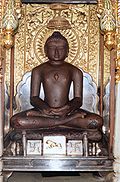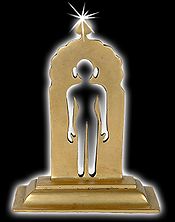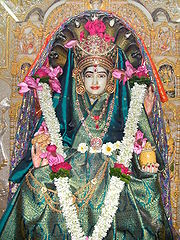
God in Jainism
Encyclopedia
Jainism
rejects the idea of any creator, mentor or destroyer God. If godliness is defined as the state of having freed one's soul from karmas and the attainment of enlightenment and a God as one who exists in such a state, then those who have achieved such a state can be termed gods. Thus, Mahavira
was God but he was not the only God, there were many other Gods too. However, the quality of godliness is one and the same in all of them. Thus, Jainism can be defined as polytheist, monotheist, nontheist and atheist varyingly, depending on one's definition of God.
Godliness can be defined as the inherent quality of any soul characterizing infinite bliss, infinite power, infinite knowledge and infinite peace. However, these qualities of a soul are subdued due to Karmas of the soul. One who achieves this state of soul through right belief, right knowledge and right conduct can be termed as God. This perfection of soul is called Kaivalya
or Bodhi
. A God thus becomes a liberated soul- liberated of miseries, cycles of rebirth, world, Karmas and finally liberated of body as well. This is called Nirvana
or Moksha
.
Gods can be thus categorized into embodied gods also known as Tīrthankaras and Arihantas or ordinary Kevalin
, and non-embodied formless gods who are called Siddha
s. Jainism considers the Devīs and Devas to be demi-goddesses and demi-gods who dwell in heavens owing to meritorious deeds in their past lives. These souls are in heavens for a fixed lifespan and even they have to undergo reincarnation as humans to achieve liberation
.
 Arihant
Arihant
s, also known as Kevalins, are gods in embodied states who ultimately become Siddha
s, or liberated souls, at the time of their nirvana
. An Arihant is a soul who has destroyed all passions, is totally unattached and without any desire and hence is able to destroy the four ghātiyā karmas and attain kevala jñāna
, or omniscience. Such a soul still has a body and four aghātiyā karmas. An Arihant, at the end of his lifespan, destroys his remaining aghātiyā karma and becomes a Siddha.
Tīrthankaras (also known as Jinas) are Arhatas who are teachers and revivers of the Jain philosophy. There are 24 Tīrthankaras in each time cycle; Mahāvīra
was the 24th and last Tīrthankara of the current time cycle. Tīrthankaras are literally the ford makers who have who have shown the way across the ocean of re-birth and transmigration and hence have become a focus of reverence and worship amongst Jains. However it would be a mistake to regard the Tīrthankaras as gods analogous to the gods of Hindu
pantheon despite the superficial resemblances in Jain and Hindu way of worship. Tīrthankaras like Arhatas ultimately become Siddhas on liberation. Tīrthankaras, being liberated, are beyond any kind of transactions with the rest of the universe. They are not the beings who exercise any sort of creative activity or who have the capacity or ability to intervene in answers to prayers.
 Ultimately all Arhatas and Tīrthankaras become Siddhas. A Siddha is a soul who is permanently liberated from the transmigratory cycle of birth and death. Such a soul, having realized its true self, is free from all the Karmas and embodiment. They are formless and dwell in Siddhashila
Ultimately all Arhatas and Tīrthankaras become Siddhas. A Siddha is a soul who is permanently liberated from the transmigratory cycle of birth and death. Such a soul, having realized its true self, is free from all the Karmas and embodiment. They are formless and dwell in Siddhashila
(the realm of the liberated beings) at the apex of the universe in infinite bliss, infinite perception, infinite knowledge and infinite energy.
The Acāranga sūtra
1.197 describes Siddhas in this way –
Siddhahood is the ultimate goal of all souls. There are infinite souls who have become Siddhas and infinite more who will attain this state of liberation. According to Jainism, the Godhood is not a monopoly of some omnipotent and powerful being(s). All souls, with right perception, knowledge and conduct can achieve self realisation and attain this state. Once achieving this state of infinite bliss and having destroyed all desires, the soul is not concerned with the worldly matters and does not interfere in the working of universe, as any activity or desire to interfere will once again result in influx of karmas and thus loss of liberation.
Jains pray to these passionless Gods not for any favors or rewards but rather pray to the qualities of the God with the objective of destroying the karmas and achieving the Godhood. This is best understood by the term – vandetadgunalabhdhaye i.e. we pray to the attributes of such Gods to acquire such attributes”
 Jainism describes existence of śāsanadevatās and śāsanadevīs, the attendant Gods and Goddesses of Tīrthankaras, who create the samavasarana
Jainism describes existence of śāsanadevatās and śāsanadevīs, the attendant Gods and Goddesses of Tīrthankaras, who create the samavasarana
or the divine preaching assembly of a Tīrthankara. Such heavenly beings are classified as:-
The souls on account of accumulation of meritorious karmas reincarnate in heavens as demi-gods. Although their life span is quite long, after their merit karmas are exhausted, they once again have to reincarnate back into the realms of humans, animals or hells depending on their karmas. As these Gods themselves are not liberated, they have attachments and passions and hence not worthy of worship.
Ācārya Hemacandra decries the worship of such Gods –
Worship of such gods is considered as mithyātva or wrong belief leading to bondage of karmas. However, many Jains are known to worship to such gods for material gains.
Jainism
Jainism is an Indian religion that prescribes a path of non-violence towards all living beings. Its philosophy and practice emphasize the necessity of self-effort to move the soul towards divine consciousness and liberation. Any soul that has conquered its own inner enemies and achieved the state...
rejects the idea of any creator, mentor or destroyer God. If godliness is defined as the state of having freed one's soul from karmas and the attainment of enlightenment and a God as one who exists in such a state, then those who have achieved such a state can be termed gods. Thus, Mahavira
Mahavira
Mahāvīra is the name most commonly used to refer to the Indian sage Vardhamāna who established what are today considered to be the central tenets of Jainism. According to Jain tradition, he was the 24th and the last Tirthankara. In Tamil, he is referred to as Arukaṉ or Arukadevan...
was God but he was not the only God, there were many other Gods too. However, the quality of godliness is one and the same in all of them. Thus, Jainism can be defined as polytheist, monotheist, nontheist and atheist varyingly, depending on one's definition of God.
Godliness can be defined as the inherent quality of any soul characterizing infinite bliss, infinite power, infinite knowledge and infinite peace. However, these qualities of a soul are subdued due to Karmas of the soul. One who achieves this state of soul through right belief, right knowledge and right conduct can be termed as God. This perfection of soul is called Kaivalya
Kaivalya
Kaivalya , which is the ultimate goal of yoga, means solitariness or detachment.The 34 Yoga Sutras of Patanjali of the fourth chapter deals with impressions left by our endless cycles of birth and the rationale behind the necessity of erasing such impressions...
or Bodhi
Bodhi
Bodhi is both a Pāli and Sanskrit word traditionally translated into English with the word "enlightenment", but which means awakened. In Buddhism it is the knowledge possessed by a Buddha into the nature of things...
. A God thus becomes a liberated soul- liberated of miseries, cycles of rebirth, world, Karmas and finally liberated of body as well. This is called Nirvana
Nirvana
Nirvāṇa ; ) is a central concept in Indian religions. In sramanic thought, it is the state of being free from suffering. In Hindu philosophy, it is the union with the Supreme being through moksha...
or Moksha
Moksha
Within Indian religions, moksha or mukti , literally "release" , is the liberation from samsara and the concomitant suffering involved in being subject to the cycle of repeated death and reincarnation or rebirth.-Origins:It is highly probable that the concept of moksha was first developed in...
.
Gods can be thus categorized into embodied gods also known as Tīrthankaras and Arihantas or ordinary Kevalin
Kevala Jñana
In Jainism, ' or ' , "Perfect or Absolute Knowledge", is the highest form of knowledge that a soul can attain. A person who has attained is called a Kevalin, which is synonymous with Jina "victor" and Arihant "the worthy one"...
, and non-embodied formless gods who are called Siddha
Siddha
A Siddha सिद्ध in Sanskrit means "one who is accomplished" and refers to perfected masters who, according to Hindu belief, have transcended the ahamkara , have subdued their minds to be subservient to their Awareness, and have transformed their bodies into a different kind of body dominated by...
s. Jainism considers the Devīs and Devas to be demi-goddesses and demi-gods who dwell in heavens owing to meritorious deeds in their past lives. These souls are in heavens for a fixed lifespan and even they have to undergo reincarnation as humans to achieve liberation
Moksa (Jainism)
' or Mokkha means liberation, salvation or emancipation of soul. It is a blissful state of existence of a soul, completely free from the karmic bondage, free from samsara, the cycle of birth and death. A liberated soul is said to have attained its true and pristine nature of infinite bliss,...
.
Arhats

Arihant (Jainism)
Arihant in Jainism is a siddha who has not yet died and thereby lost all aghatiya karma. The Ṇamōkāra mantra begins, Ṇamō arihantāṇaṁ "I praise the arihants"....
s, also known as Kevalins, are gods in embodied states who ultimately become Siddha
Siddha
A Siddha सिद्ध in Sanskrit means "one who is accomplished" and refers to perfected masters who, according to Hindu belief, have transcended the ahamkara , have subdued their minds to be subservient to their Awareness, and have transformed their bodies into a different kind of body dominated by...
s, or liberated souls, at the time of their nirvana
Nirvana (Jainism)
' in Jainism means final release from the karmic bondage. When an enlightened human, such as an Arihant or a Tirthankara extinguishes his remaining aghatiya karmas and thus ends his worldly existence, it is called . Technically, the death of an Arihant is called of the arihant, as he has ended...
. An Arihant is a soul who has destroyed all passions, is totally unattached and without any desire and hence is able to destroy the four ghātiyā karmas and attain kevala jñāna
Kevala Jnana
In Jainism, ' or ' , "Perfect or Absolute Knowledge", is the highest form of knowledge that a soul can attain. A person who has attained is called a Kevalin, which is synonymous with Jina "victor" and Arihant "the worthy one"...
, or omniscience. Such a soul still has a body and four aghātiyā karmas. An Arihant, at the end of his lifespan, destroys his remaining aghātiyā karma and becomes a Siddha.
Tīrthankaras
Tīrthankaras (also known as Jinas) are Arhatas who are teachers and revivers of the Jain philosophy. There are 24 Tīrthankaras in each time cycle; Mahāvīra
Mahavira
Mahāvīra is the name most commonly used to refer to the Indian sage Vardhamāna who established what are today considered to be the central tenets of Jainism. According to Jain tradition, he was the 24th and the last Tirthankara. In Tamil, he is referred to as Arukaṉ or Arukadevan...
was the 24th and last Tīrthankara of the current time cycle. Tīrthankaras are literally the ford makers who have who have shown the way across the ocean of re-birth and transmigration and hence have become a focus of reverence and worship amongst Jains. However it would be a mistake to regard the Tīrthankaras as gods analogous to the gods of Hindu
Hindu
Hindu refers to an identity associated with the philosophical, religious and cultural systems that are indigenous to the Indian subcontinent. As used in the Constitution of India, the word "Hindu" is also attributed to all persons professing any Indian religion...
pantheon despite the superficial resemblances in Jain and Hindu way of worship. Tīrthankaras like Arhatas ultimately become Siddhas on liberation. Tīrthankaras, being liberated, are beyond any kind of transactions with the rest of the universe. They are not the beings who exercise any sort of creative activity or who have the capacity or ability to intervene in answers to prayers.
Siddhas

Siddhashila
Siddhashila is an area in Jain cosmology at the apex of the universe, which is where the Jains believe people who have become Arihants, or people with infinite knowledge, go after they die and attain moksha or nirvana. Such people are called siddhas after they discard their mortal body, hence the...
(the realm of the liberated beings) at the apex of the universe in infinite bliss, infinite perception, infinite knowledge and infinite energy.
The Acāranga sūtra
Acaranga Sutra
The Acaranga Sutra is the first of the eleven Angas, part of the agamas which were compiled based on the teachings of Lord Mahavira.The Acaranga Sutra discusses the conduct of a Jain monk...
1.197 describes Siddhas in this way –
Siddhahood is the ultimate goal of all souls. There are infinite souls who have become Siddhas and infinite more who will attain this state of liberation. According to Jainism, the Godhood is not a monopoly of some omnipotent and powerful being(s). All souls, with right perception, knowledge and conduct can achieve self realisation and attain this state. Once achieving this state of infinite bliss and having destroyed all desires, the soul is not concerned with the worldly matters and does not interfere in the working of universe, as any activity or desire to interfere will once again result in influx of karmas and thus loss of liberation.
Jains pray to these passionless Gods not for any favors or rewards but rather pray to the qualities of the God with the objective of destroying the karmas and achieving the Godhood. This is best understood by the term – vandetadgunalabhdhaye i.e. we pray to the attributes of such Gods to acquire such attributes”
Heavenly Beings

Samavasarana
Samavasarana or Samosarana "Refuge to All" is a Jain term for the divine preaching hall or the assembly of the Tirthankara after attaining perfect knowledge or Kevala Jnana. It also refers to the hall in which the speech is given...
or the divine preaching assembly of a Tīrthankara. Such heavenly beings are classified as:-
- Bhavanpatis – Gods dwelling in abodes
- Vyantaras – Intermediary gods
- Jyotiskas – Luminaries
- Vaimānikas – Astral gods
The souls on account of accumulation of meritorious karmas reincarnate in heavens as demi-gods. Although their life span is quite long, after their merit karmas are exhausted, they once again have to reincarnate back into the realms of humans, animals or hells depending on their karmas. As these Gods themselves are not liberated, they have attachments and passions and hence not worthy of worship.
Ācārya Hemacandra decries the worship of such Gods –
Worship of such gods is considered as mithyātva or wrong belief leading to bondage of karmas. However, many Jains are known to worship to such gods for material gains.
See also
- Jainism and non-creationismJainism and non-creationismJainism does not support belief in a creator deity. According to Jain doctrine, the universe and its constituents - soul, matter, space, time, and principles of motion have always existed . All the constituents and actions are governed by universal natural laws...
- Moksa (Jainism)Moksa (Jainism)' or Mokkha means liberation, salvation or emancipation of soul. It is a blissful state of existence of a soul, completely free from the karmic bondage, free from samsara, the cycle of birth and death. A liberated soul is said to have attained its true and pristine nature of infinite bliss,...
- Nirvana (Jainism)Nirvana (Jainism)' in Jainism means final release from the karmic bondage. When an enlightened human, such as an Arihant or a Tirthankara extinguishes his remaining aghatiya karmas and thus ends his worldly existence, it is called . Technically, the death of an Arihant is called of the arihant, as he has ended...
- Nontheistic religionsNontheistic religionsNontheistic religions are traditions of thought within religions, some otherwise aligned with theism, others not, in which nontheism informs religious beliefs or practices...

